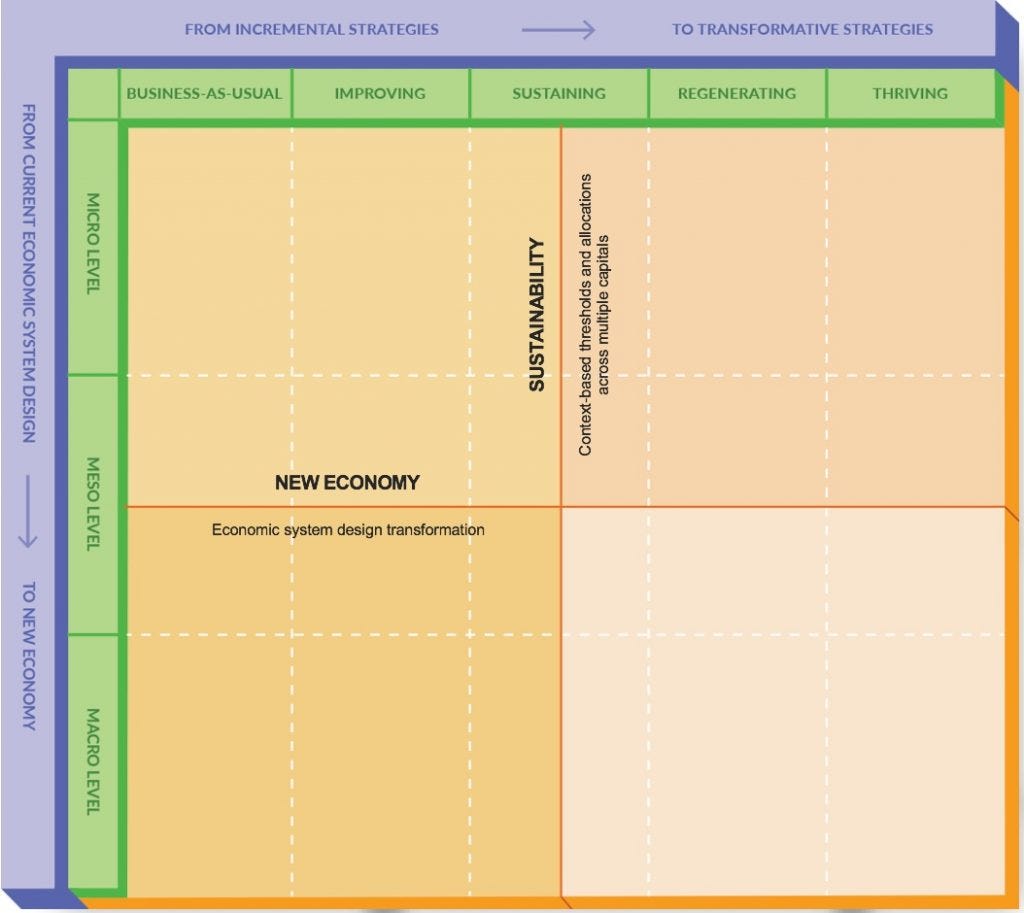Envisioning Change Helps Businesses Shift to Climate Change Solutions

Any sustainability consultant worth their salt will have thought at some point, “Am I just perpetuating the system I say I want to change?” Many of us will suffer that self-doubt regularly, wondering whether we are driving real change or just window-dressing the status quo. Lipstick, pigs, etc.
It wasn’t always so. I was early into sustainability reporting and lucky enough to work with some pioneering clients. The energy company TXU in the east of England (now defunct — nothing to do with me!) had signed up to the at-the-time emerging guideline for sustainability reporting called the Global Reporting Initiative (GRI). And when the guidelines were still in their pilot phase, I consulted on and wrote the first report published in the UK that used the GRI.
In the spring of 2001, the first adidas social and environmental report was published. Called Our World, it explicitly acknowledged the “less visible world where we manufacture our sporting products” in stating its ambition to be a warts-and-all account of the company’s performance. To deliver on that promise, I encouraged David Husselbee, then director of social and environmental affairs for adidas, to include a table that showed the 22 prevalent labour rights issues in the 21 countries across Asia, Europe and the Americas where adidas sourced. Detailed aspects of challenges around forced labour, wages and benefits were unpacked, country by country. The legend made it clear this was the principal reason for suppliers in that country failing to meet the adidas code of conduct. Recording this was the first step to working with suppliers to fix it.
These were bold moves by my clients, and I found the work engaging — even though it was just reporting. Why? Because I could see the strategic changes that resulted from the work I was doing. At adidas, Husselbee was able to draw on more resources and create a team to address the many social compliance issues the company found in its supply chain. And over 15 years working with Husselbee and his successor Frank Henke, we helped move adidas from being associated with child labour to being recognized as a leader in sustainability with best-in-class performance on human rights and an eye-catching relationship with NGO Parley for the Oceans, making dozens of products from recycled ocean plastic.
Junxion is part of the community of businesses that have used a third-party verification of their impact. Use the free B Impact Assessment to evaluate your company’s impact on all stakeholders, including the environment, your workers, your community and your customers.
Incrementalism Is No Longer Enough
Here’s the kicker: Adidas improved steadily over time to reach the position it enjoys today — but even that is not enough. As the futurist Alex Steffen commented in 2017, “All meaningful sustainability work is now disruptive.” It has to be, because of the urgency of the need for change. We now know from the Intergovernmental Panel on Climate Change that we have 12 years to make “rapid, far-reaching and unprecedented changes in all aspects of society.”
We are overshooting planetary boundaries while falling short on meeting basic human needs.
All aspects of society — i.e. not just ecological. Last year, the United Way concluded that 43% of American households could not afford all housing, food, transportation, child care, health care, and mobile phone costs. We are overshooting planetary boundaries while falling short on meeting basic human needs. We need a new system—and quickly.
Through 20-plus years of sustainability consulting, I have tried to get all my clients to be as ambitious as adidas. On reflection, I have failed. I have pushed, but sometimes to no avail. And in that failure, I have become disheartened and discouraged. In common with all of us, I want my work to contribute something of value to the world. Sometimes I fall short. But I have been able to set a plan to change through my work with the Reporting 3.0 framework.
Context Is Key
Using a metaphor of a climb up “Mount Thriveability,” Reporting 3.0 sets out a process for true sustainability measurement, reporting and strategy that will create the world we want.
From the early days of the GRI, there was a call for reporting entities to set their performance in the broader biophysical, social and economic context. But this was almost always ignored. And Reporting 3.0 places the need to establish that context at the heart of its approach.
Reporting on an annual improvement of, say, 3% lower carbon emissions is meaningless without establishing that company’s fair share of carbon emissions to stay within 1.5 degrees of global heating over pre-industrial levels. Without context, we don’t know if the 3% performance improvement is good or bad or happening quickly enough or far too slowly.
To make this feasible, the United Nations Environment Programme has stated that we need to establish thresholds and allocations for all social and ecological impacts. And to that end, Junxion has signed a letter of support for Reporting 3.0 to convene a multi-stakeholder Global Thresholds and Allocations Council. We need a body that will identify the thresholds and come up with fair allocations and produce ready-reckoners for consultants like me to apply with our clients.
And these thresholds and allocations must be across all capitals — human, social, intellectual, natural, built and financial. Because to measure a company’s commitment to a genuinely sustainable strategy, we need to know the degree to which a company is preserving or diminishing the stocks of all these capitals.
Blending the Personal and the Professional
To guide us all on this transformation journey, Reporting 3.0 has produced a strategy continuum that clearly shows how far we have to push our clients or our companies so that we have thriving businesses operating in a new economy.

As the strategy continuum shows, there are several levels where we need to work: the micro (single business), the meso (industry or sector) and the macro (the whole system). In short, we need changed mindsets before we can have changed systems.
Reporting 3.0 explicitly acknowledges the personal challenge, or “career risk,” that is implied in taking this work forward. It calls on us all to conduct a gap analysis between our individual personal ambition as it affects our work and what the world needs and then to backcast from there.
This is aligned with Junxion’s status as a Certified B Corporation and our current work practices. We love being a B Corp because not only does the certification process offer dozens of great ideas on how to run a better business, it’s a way we can show up as the type of business we want to see in the world.
And in our strategy work, we use a guided meditation technique to help organizations set a vision for a world made better by their work — one that is far beyond their usual day-to-day imagination. And then we set a plan to work creatively toward that vision. Yes, decisions are made about what is feasible, but that’s done after the vision is set and the options creatively explored. We have the freedom to make those choices — to imagine better.
That same backcasting technique, when applied to the world we want to live in, is explicitly normative. It is setting what the future should be according to agreed needs and limits, then imagining the path toward it from where we are today.
Meaning Matters
Last year, Junxion developed the communications strategy for the UN Principles for Responsible Banking. It was a project I loved, and it was only through exploring Reporting 3.0’s work that I fully appreciated why I enjoyed it so much. The principles are explicitly normative: They call for banks — indeed the whole global banking industry — to align their business strategies with the targets in the Sustainable Development Goals and the Paris climate agreement. They demand banks backcast from what the world needs and shape their business strategy accordingly.
“Meaning comes from being connected to what inspires us.”
As the organisational behaviour practitioner Lani Morris says, “Meaning comes from being connected to what inspires us and being called toward what could be.”
For some time, I have been dispirited and impatient at the lack of progress toward the world we want and need. Reporting 3.0 has helped me understand that through exploring my role and by committing to making bold, norms-based demands of my clients, I can “return to myself.”
Beyond the tools and the ideas, the real power of Reporting 3.0 lies in its capacity to bring together purpose and meaning, and to enable me to sound my own unique note in the universe.
That is what I have found in my climb up Mount Thriveability. And so let us all sound our unique notes in the universe. Let’s be audacious, together.
Adam Garfunkel is an owner and managing director at Junxion. This is an edited version of his talk at the Reporting 3.0 Implementing Thriveable Transformation conference earlier this month in Rotterdam.
B the Change gathers and shares the voices from within the movement of people using business as a force for good and the community of Certified B Corporations. The opinions expressed do not necessarily reflect those of the nonprofit B Lab.

Sustainability in Business: Finding Meaning Through Consulting was originally published in B the Change on Medium, where people are continuing the conversation by highlighting and responding to this story.